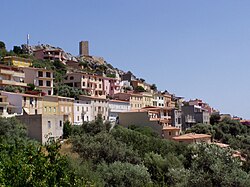Posada, Sardinia: Difference between revisions
Hazard-Bot (talk | contribs) m Bot: Replacing {{Wikitravel}} with {{Wikivoyage-inline}} |
No edit summary |
||
| Line 60: | Line 60: | ||
The castle became then the seat of the Baron of Posada, a title and a [[fief]] created in 1431 for Don Nicolò Carroz and formally ended in 1856, when it was finally bought by the [[House of Savoy|kingdom of Sardinia]] (the last one of all Sardinian fiefs). |
The castle became then the seat of the Baron of Posada, a title and a [[fief]] created in 1431 for Don Nicolò Carroz and formally ended in 1856, when it was finally bought by the [[House of Savoy|kingdom of Sardinia]] (the last one of all Sardinian fiefs). |
||
==Tourism== |
|||
Tourism in Posada is relatively undeveloped. Perfect sandy beach is mostly occupied by locals, which makes it attactive for those who looking for quiet place. |
|||
==References== |
==References== |
||
Revision as of 12:31, 18 January 2013
Posada | |
|---|---|
| Comune di Posada | |
 | |
| Country | Italy |
| Region | Sardinia |
| Province | Province of Nuoro (NU) |
| Frazioni | San Giovanni di Posada, Sas Murtas, Montelongu |
| Area | |
• Total | 33.52 km2 (12.94 sq mi) |
| Elevation | 37 m (121 ft) |
| Population (Dec. 2004)[2] | |
• Total | 2,394 |
| • Density | 71/km2 (180/sq mi) |
| Demonym | Posadini |
| Time zone | UTC+1 (CET) |
| • Summer (DST) | UTC+2 (CEST) |
| Postal code | 08020 |
| Dialing code | 0784 |
Posada (Template:Lang-la, Template:Lang-sc),[3] also previously known as Feronia or Pausata, is a comune (municipality) in the Province of Nuoro in the Italian region Sardinia. The city sits on the coast of the Tyrrhenian Sea. As of 31 December 2004, it had a population of 2,394 and an area of 33.52 km².[4]
Posada borders the following municipalities: Budoni, Siniscola and Torpè.
History
Within Posada's territory was the ancient city of Feronia or Pheronia, the foundation of which is ascribed to the Faliscans, which contained a now lost temple to the Etruscan goddess Feronia.
During the Roman period, the town's importance declined with the foundation of nearby Portus Luguidonis.
In the Middle Ages, Posada was main town of an historical district called Baronia di Posada or Baronia Alta (to be distinguished from Baronia Bassa or Baronia di Orosei/Galtelli'), on the Tyrrhenian coast of the island.
The ancient part of the town is in a spectacular position on the top of a hill, where it preserves a particular medieval historical center, with ruins of a castle (Castello della Fava) and a square panoramic tower of the 13th century.
The castle has been the equivalent of a holiday residence for the Giudichessa Eleanor of Arborea, and was object of alternate possession by the Giudicato d'Arborea and the Aragon, during the long fight before the Spanish conquest.
The castle became then the seat of the Baron of Posada, a title and a fief created in 1431 for Don Nicolò Carroz and formally ended in 1856, when it was finally bought by the kingdom of Sardinia (the last one of all Sardinian fiefs).
Tourism
Tourism in Posada is relatively undeveloped. Perfect sandy beach is mostly occupied by locals, which makes it attactive for those who looking for quiet place.
References
- ^ "Superficie di Comuni Province e Regioni italiane al 9 ottobre 2011". Italian National Institute of Statistics. Retrieved 16 March 2019.
- ^ "Popolazione Residente al 1° Gennaio 2018". Italian National Institute of Statistics. Retrieved 16 March 2019.
- ^ Richard Talbert, Barrington Atlas of the Greek and Roman World, (ISBN 0-691-03169-X), Map 48.
- ^ All demographics and other statistics: Italian statistical institute Istat.

